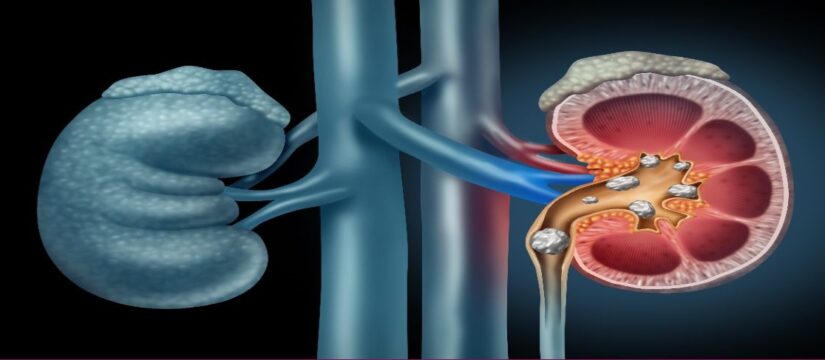
Dietary Guidelines to Prevent Kidney Stone
A kidney stone is a solid piece of material that passes through the urinary tract and into the kidney from the ureter. It is formed from uric acid, a waste product that’s normally discharged along with urine.
Kidney stones can be caused by too much uric acid in your body or an imbalance of minerals such as calcium and oxalate. Also, having a diet higher in fat and cholesterol will increase uric acid in your body over time. However, not all kidney stones are the same.
The average kidney stone is about 5 mm in length. Kidney stones less than 4 mm can be easily dissolved and will pass out on their own without any medications. At the same time, kidney stones between 4mm and 6mm will only have about 60% of them pass on their own. Whereas, anything bigger than 6mm will require medical intervention.
The incidence of urolithiasis (kidney and ureteric stones) is on the rise in a few states of India. This problem usually affects the young population. The chances of its recurrence are 7% per year meaning that the chances of reforming the stone are 35% at the end of 5yrs and more than 50% at the end of 10yrs. The treatment of urolithiasis is not only surgical or endoscopic removal of the stone but also prevention of further stone formation. By making changes in lifestyle and dietary modification one can reduce the chances of recurrence.
The most common type of kidney stones results from too much calcium and oxalate in the urine. These minerals bind together as crystals, forming stones.
Are all Kidney Stones the same?
Not all kidney stones are the same. There are two different kinds of kidney stones: calcium-rich and uric acid-rich, and they are called Calcium oxalate stones and uric acid stones, respectively.
- Calcium Oxalate Stones: Calcium oxalate stones make up about 80% of all kidney stones. Dehydration is one of the main causes of the formation of calcium oxalate stones. A diet rich in protein, oxalate, salt, and sugar can also increase the risk of calcium oxalate kidney stones. Some underlying medical conditions, such as hyperparathyroidism or inflammatory bowel disease, can also lead to the formation of calcium oxalate stones in the kidney.
- Uric Acid Stones: Uric acid stones make up about 15% of all kidney stones. The main reason for the formation of uric acid stones is excessive uric acid production. Low or very low intake of potassium and magnesium can also lead to uric acid kidney stones. Few underlying medical conditions, such as Type diabetes 2 and obesity, also increase the risk for uric acid stones.
Recommended Diet Plan to Prevent Kidney Stones
The most important factor to preventing kidney stone formation definitely is drinking enough fluids and following a diet. In fact, the best diet for kidney stones is mainly composed of fruits and vegetables.
You can stick to vegetables that don’t contain oxalates, such as cauliflower, broccoli, carrots, potatoes, lettuce, and green beans. Likewise, citrus fruits such as grapes, oranges, and lemons are best for blocking the formation of kidney stones. Drinking citrus fruit juices is also a great way to fight against kidney stones.
Adding more calcium to your diet is essential to reduce the risk of kidney stones. You add some calcium to your diet in the form of dairy products. Having a glass of milk along with calcium-fortified food such as bread is perfect for breakfast. And for lunch, you can have rice or oats. Both have low oxalate levels and are safe for kidney stones.
The following dietary guidelines can help to prevent kidney stones.
- Avoid high doses of vitamin C supplements
Vitamin C supplements contain oxalates, which, if taken in excess, can lead to calcium oxalate kidney stones. Some studies have also found that supplementing vitamin C can cause kidney stones in people who are not prone to them. It is because oxalate is a byproduct of the breakdown of vitamin C.
- Avoid vitamin D supplements
Excessive vitamin D consumption can also lead to kidney stones, especially if you are not exposed to sunlight. Those with a history of kidney stones should seriously avoid taking vitamin D supplements.
- Avoid extra calcium supplements
Excessive calcium supplements can also be a major risk factor for kidney stones. Those with a history of kidney stones should avoid calcium supplements to reduce the risk of recurrence.
- Limit salt intake
Salt (sodium) increases the amount of calcium in your urine. Limit sodium intake to less than 2300mg per day.
To reduce salt /sodium:
- Buy fresh food, or foods without salt – fruit, fresh vegetables, fresh meats, chicken, fish, eggs, porridge, rice, pasta
- Most sodium (75%) comes from processed foods. Limit processed foods high in salt e.g. soup, sauces, gravy, crisps and snack foods.
- “low salt” or “no added salt” foods are the best choices. Look for sodium content of less than 150 mg per serving as a guideline. Note that some “reduced salt” products can still contain high levels of sodium.
- Do not add salt at the table or in cooking.
What can I use instead?
- freshly ground pepper, dry mustard powder
- lemon juice, lime juice, vinegar
- a sprinkle of dried herbs or chopped fresh herbs
- garlic, curry, chilli, onion, fresh ginger, spring onions
- Limit foods high in oxalate
- Reducing oxalate in your diet helps to reduce the amount of oxalate in your urine.
- Limit intake of rhubarb, spinach, silverbeet, beetroot, eggplant, sweet potato, celery, leeks
- nuts, peanut paste
- strong black tea, orange juice chocolate
- wheat bran and wheat germ
- berries (eg strawberries, blackberries), dried figs
- Drink plenty of fluid
- Drink more fluid, especially water When you do not consume the right amount of water, then you may have to face gastric problemand constipation.
- Drinking water helps to flush out the kidney’s stone-forming substances, making stones less likely to form.
- Drink at least 3 litres, or 12 cups, of fluid daily. At least half of this should be water (soda, mineral, spring, or plain tap water).
- Have a cup of fluid (250ml) each hour during waking hours, and a large glass of water before going to bed. Drink a glass of water if you wake up during the night.
- Spread out your fluid intake during the day.
- Avoid strong black tea and orange juice, as these are high in oxalates.
- Avoid grapefruit juice, cranberry juice (if more than 500ml/day), and sugary drinks. Drinking large amounts of sugary drinks (soft drinks, cordial) can lead to weight gain. Choose diet or low joule drinks to limit weight gain.
- Lemon juice is a good source of citrate which helps to prevent stones from forming.
- Drink 100ml of lemon juice daily (could be added to water).
- Include adequate calcium in your diet
- Dietary calcium is important for your bonesand teeth. Adequate dietary calcium intake is recommended.
- Include at least 2-3 choices daily from the following list
- 250ml milk (eg trim, skim, full cream, calcium-fortified soy milk)
- 200ml high calcium milk eg Physical 200g (small tub) yoghurt
- 40g cheese (2 slices) 3 scoops ice cream
- Include only a moderate amount of animal protein
Limit protein from meat, seafood, fish, chicken, and eggs to a moderate serve (120 -150g) daily (cooked) (note 60g meat = 2 eggs)
- Choose wholemeal and wholegrain foods
- Eating foods higher in fibre can decrease the risk of stone formation by reducing the amount of calcium and oxalate you absorb
- Choose wholemeal and wholegrain bread, flour, cereals, pasta, biscuits, and crackers
- Increase fruit and vegetable intake
Avoid dry fruits in excessive quantity. Almonds inhibit stone formation.
Follow Daily Diet Plan to Prevent Kidney Stones
To prevent the occurrence of kidney stones, you need to ensure a good diet plan. Mentioned below is an example of a diet plan:
- In breakfast, have a bowl of oatmeal, along with blueberries and a glass of milk.
- Lunch can include whole grain bread, salad with low sodium dressing, and a glass of Yogurt Parfait.
- Dinner should consist of wild rice, asparagus, salmon, and yogurt dil sauce.
- Drink lots of fluids.
- Eat foods that are rich in calcium.
- Ensure that your diet has moderate amounts of protein.
- Keep your salt intake in check.
What is considered the best home remedy for kidney stones?
Apple cider vinegar is the best solution for dissolving kidney stones. The acetic acid in apple cider vinegar is known to soften the stone so that it can be passed out in the urine without any trouble. If you have any previous history of kidney stones, following a diet for kidney stone as recommended by a dietician or physician will help you prevent a recurrence.
What is necessary to prevent kidney stones formation?
The most important factor to prevent kidney stones is to consume enough fluids and avoid dehydration. When you do not regulate the water intake, your metabolism slows down, which leads to a reduction in blood acidity. The reduction in acidity has been found to be the strongest risk factor for kidney stones. In addition, following a proper diet for kidney stones will also help reduce the risk of kidney stone formation.
Conclusion
The most important factor to prevent kidney stone formation is to consume enough fluids and avoid dehydration. In general, a diet rich in fruits and vegetables can help you prevent the formation of kidney stones. Along with following a diet for kidney stone, you should also avoid excess vitamin C supplements, excessive vitamin D supplements, and extra calcium supplements.



Leave Your Comment